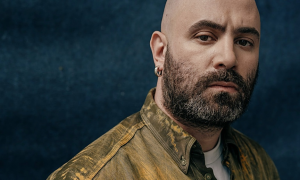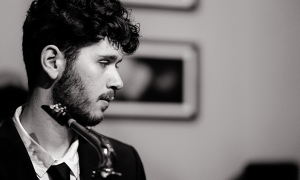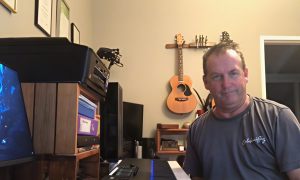Home » Jazz Articles » Take Five With... » Take Five with Neal Barnard of CarbonWorks
Take Five with Neal Barnard of CarbonWorks

Meet Neal Barnard:
Raised in North Dakota's cattle country, Neal Barnard grew up studying piano and cello. Barnard started composing and recording songs in the 80s. With a penchant for the avant-garde, Neal constantly writes songs that defy any genre categorization. He chooses unconventional time meters as well, in order to "tilt the song ever so slightly and give you that little jolt between the ears," as he puts it. Barnard launched CarbonWorks at a 2016 event at New York's Metrograph, hosted by Alec Baldwin and Maggie Q. Its line-up included singers from Italy, France, and the U.S., with rock and classical instrumentalists. While this is Barnard's fourth album, following Pop Maru, Verdun, and CarbonWorks' 2016 release, he is better known as a medical pioneer who formed the Physicians Committee in 1985 to rally for prevention, nutrition, and higher ethical standards in research. In 2006, funded by the National Institutes of Health, Barnard used a low-fat vegan diet to revolutionize the treatment of type 2 diabetes and has used similar approaches to skewer weight problems, women's health issues, and other medical challenges. "In music or medicine, we have to look out of the box," he says. Michael Friedman wrote in Psychology Today, "Neal Barnard has never been one to accept the status quo." Next year Barnard and his band CarbonWorks will release Vanishing Act, a 10-track experimental album featuring international vocalists and musicians.Instruments:
Guitar and keyboards. My main guitar is a 1974 Les Paul Custom to which I added a DeMarzio pickup for extra bite, and Schaller tuning heads for better intonation. I also have a Steinberger—a guitar with no head and virtually no body. I bought for travel, but it turns out to be a really great guitar in its own right. Because it is a single piece of carbon fiber, it never goes out of tune—even when you use if for shoveling snow or hammering nails. When I want a killer clear tone and swoops and dives, I use a Fender Strat. It is basically straight off the shelf, and a wonderful guitar.Teachers and/or influences?
In high school, it was Cream and Jimi Hendrix, and then John McLaughlin and Mahavishnu Orchestra. I came to love odd meters, like 7/4 or 11/8, or whatever makes your heart skip a beat. I lived in Europe briefly as a youngster, which was a great introduction to other languages, musicians, and personal values. And on the completely other side of things, the incredible String Band was a really creative Scottish band in the 1960s and 1970s that would do anything and everything. Then I fell into punk and New Wave and landed on the slightly more dissonant side of that in my band Pop Maru, which was a fixture in Washington, DC, way back when. Simple, loud, and angsty. One day in San Francisco, I found a cassette of traditional Vietnamese music by Trio Dong Phuong and discovered that Vietnamese music uses a pentatonic scale, just like blues, and can be extremely soulful. I bought every CD I could find by Phi Nhung, and incorporated Vietnamese language and instruments into my music. For many musicians, a huge and nefarious influence is money, which pushes us to restrain creativity in favor of what we think will sell. It is important to resist that. Van Gogh sold only one painting in his lifetime and would no doubt have done better with paint-on-velvet Elvis portraits. But as Henry Heimlich, the inventor of the Heimlich Maneuver, once said, if everyone understands what you are doing, it's not creative. Bottom line, pursue the art not the money. Money may or may not follow.I knew I wanted to be a musician when...
The Beatles were on the Ed Sullivan Show. Up until then, I played piano and cello, but more as an obligation than a love. The Beatles showed that music could be fun, irreverent, and loud.Your sound and approach to music:
When I write, I close my eyes and imagine that I'm in an auditorium where the curtain is going up. Imaginary musicians take their places and start playing the most compelling music ever. I let it evolve in my mind wherever it wants to go, then do my best to write it down and record it. An album, for me, is not a collection of songs in a single genre. Rather, it is more like a movie soundtrack that evolves through many moods. Also, vocals are not necessarily just words. The French language accentuates vowels and downplays consonants, so it's smooth like a saxophone. English is heavy on the consonants, like a piano. Italian is between the two. Also, if the listener needs to dig a little for the meaning, the result can be more profound than when you just get whacked over the head with it. That's why opera is beautiful in Italian or French and cheap in English. So we can use language for its musical and emotional qualities. I write in English and French, and we have incorporated Italian, German, Flemish, and Vietnamese, all of which have something important to say.Your dream band:
We have it now. CarbonWorks' new album includes Dolche, Lara Lotz, and Martha Roebuck as singers in Italian, French, and English, Allegra Havens on violin, Bobby Read on saxophone, Shea Roebuck on bass, and Mike Stetina on drums, along with my longtime friend and collaborator Bob Gray, and other collaborators. They are the best in the world at what they do, and it is a privilege to work with them. On our last album, Chris Thomas King joined us, and he is really the reigning king of the blues, in my book. And Phi Khanh and Chau Nguyen brought us the best of Vietnamese music. These are the people I really love making music with. And as important as the musicians are the people who do the recording and engineering. Johnny Terrell is a brilliant engineer in Virginia, and Katie Tavini is a mastering genius in Brighton. When you work with great people, life is worth living.Road story: Your best or worst experience:
A complication that I have is that, although I have been a musician since age six, I also went to medical school. When I was a medical resident, I was rotating through a psychiatric ward, where one of the patients was a young woman with an eating disorder that was serious enough to require hospital treatment, but not so bad that she could not go out on an occasional pass. One night I was playing at the 9:30 Club—DC's original great music venue—and into the dressing room walked this young patient, who was out partying, I guess, and had stumbled through the door by accident. She was stunned to see her doctor tuning up his guitar to go on stage. She quickly exited. On Monday morning, one of the senior physicians grabbed me and said, "I'm worried about X (the young patient). She is sicker than I thought! She has started hallucinating! She insists that she saw you playing in a punk band downtown. We need to start her on antipsychotics right away."Favorite venue:
Well, we were used to places that did treat musicians very well. So when we started playing the 9:30 Club, we loved it. Dressing room, great sound, big enough for a crowd but small enough to hear easily. When venues get too big, it's harder to engage. My favorite place in the universe is the Guthrie Theater in Minneapolis, with its round stage and the audience all around. There is nothing between the musicians and the audience.Your favorite recording in your discography and why?
If I had to pick a song, it would be between "Song to a Sparrow" on Verdun, or "Tout Ira Bien" or "Athena" on the CarbonWorks' Vanishing Act. But if you asked me the same question tomorrow, it would be "Samurai" or "Song for an Angel." I love them all. Album-wise, I always love the most recent one. So for now that's CarbonWorks' Vanishing Act. It starts a bit cerebrally with "Athena" and "International Anthem," then lets the listener jump up and dance with a couple of New Wave songs. It then gets a bit dark and moody, before finishing off with the most beautiful lullaby you have ever heard, sung first in French, then in English. It is more like a movie score than a typical record, because the moods vary so much, but the music is novel and adventurous without leaving the listener behind.The first albums I bought were:
Dolche: Exotic Diorama, Carmen Maria Vega: Mistinguette and Huey Lewis and the News: Sports.What do you think is the most important thing you are contributing musically?
Musically, I always want to break the mold. I can never, ever do a "regular" song. We always try new things. However, at the risk of sounding sacrilegious, it has to be said that, music, art, and beauty in general are meaningless in and of themselves. In an increasingly cruel world, where hatred and violence are becoming normalized, both on an individual and worldwide scale, music's role may be to try to touch the heart and to validate humanity's softer side. Many of our songs try to seduce the listeners musically and then plant a lyrical thought which is usually about the need for compassion, not only for people, but for animals, too, who need all the friends they can get. You will see that in the videos for "Louder than Words," "Samurai," and many others, and it's often the theme that emerges most strongly. Our "International Anthem" is a volley against nationalism. But, of course, the end result has to be something that people want to hear again and again, so the message has to be delivered carefully.Music you are listening to now:
Alain Souchon: C'est Déjà CaJimi Hendrix: Band of Gypsies
Mahavishnu Orchestra: Inner Mounting Flame
Patricia Kaas: Tour de Charme
Incredible String Band: I Looked Up
What is in the near future?
Vanishing Act is just coming out, and we are transforming the songs into music videos. It's fun to see how the visuals sometimes alter the experience of the song. We saw that in our last album with "Samurai," which is a hard-edged song in 15/8 time. But the video depicts an angelic little girl who dreams of being a samurai to rescue her animal friends, and the song suddenly feels soft and fun.What's your greatest fear when you perform?
Losing intonation. As a child, my parents dutifully went to our orchestral concerts, and because it is hard for kids to play string instruments, our intonation was really cruel and unusual punishment. I have never wanted to inflict that on anyone.What song would you like played at your funeral?
Anything I can perform live.What is your favorite song to whistle or sing in the shower?
I have to confess I find myself making fun of macho songs. "Some men climb a mountain..." (Baby the Rain Must Fall), "Put silver wings on my son's chest..." (The Ballad of the Green Berets), "You're havin' my baby, what a lovely way of sayin' how much you love me... " (Having My Baby). Sometimes, we men get carried away with our testosterone-filled nonsense, and you can't help but laugh.By Day:
Neal D. Barnard is an American author, clinical researcher, and founding president of the Physicians Committee for Responsible Medicine.If I could have dinner with anyone from history, who would it be and why?
Bill Gates, because he'd pick up the check.Tags
PREVIOUS / NEXT
Support All About Jazz
 All About Jazz has been a pillar of jazz since 1995, championing it as an art form and, more importantly, supporting the musicians who make it. Our enduring commitment has made "AAJ" one of the most culturally important websites of its kind, read by hundreds of thousands of fans, musicians and industry figures every month.
All About Jazz has been a pillar of jazz since 1995, championing it as an art form and, more importantly, supporting the musicians who make it. Our enduring commitment has made "AAJ" one of the most culturally important websites of its kind, read by hundreds of thousands of fans, musicians and industry figures every month.

























